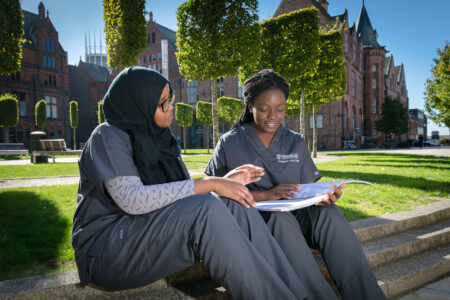Global health is where passion meets purpose — a field where every discovery and innovation holds power to save lives by levelling the playing field, dismantling barriers, or turning data into solutions that ripple across borders. This is just a gist of what the University of Liverpool aims to achieve through its global health Master of Science (MSc) programmes.
Among the lineup is a Master of Public Health (MPH) that immediately caught Dr. Mohammad Sameer Shahid’s attention. His decision to pursue the MPH stemmed from his experiences during the COVID-19 pandemic. As a practising junior doctor then, he recognised the limits of a purely medical approach to health issues. “Coming from a country like Pakistan that has a lot of health inequalities — whether that be child health, maternal health, or general health — I saw there’s a lot of work to be done,” he says.
This is why the University of Liverpool seemed like the perfect fit. The university, which ranks 78th in the global Top 100 for Life Sciences & Medicine, is home to a Faculty of Health and Life Sciences that is equally passionate about creating a healthier, more equitable world.
Several mentors and consultants validated Dr. Shahid’s choice, as they are alumni of Liverpool. “It was a satisfactory moment for me — to follow in the footsteps of people I look up to,” he says.
True enough, the MPH programme has thoroughly prepared him for the multifaceted nature of public health work with a multidisciplinary blend of medical, sociological, and research perspectives. From modules on health governance and biostatistics to hands-on qualitative research, the programme has taught him everything there is to know about critically appraising data, synthesising evidence, and advocating for actionable policies.
However, Dr. Shahid believes the most impactful aspect of his course so far has been its emphasis on understanding global health issues through local and international lenses. Group projects addressing topics like malaria in African and Asian countries offered real-world context and reiterated the interconnectedness of global health systems. “I now know how to advocate the right policies and recommendations, and I feel like I can make a real change now,” he shares.

Dr. Shahid aims to pursue a PhD at the University of Liverpool some day. Source: University of Liverpool
Upon graduating, Dr. Shahid will join the ranks of Liverpool’s notable MPH alumni — like Director of Public Health for Liverpool Professor Matthew Ashton, Founder and CEO of RedAid Nigeria Dr. Daniel Egbule, and trailblazer in social impact and mentorship Mai Khidir, who is a Consultant at The Better Org, Founder & CEO of Al Sudaniya Mentoring, and one of the Women Leaders for the World Fellow.
Liverpool’s MSc Global Healthcare Ethics is just as effective when it comes to launching impactful careers — a fact proven by graduates like Dr. Deval O’Dedra, who is currently in a specialist training post at Liverpool University Hospitals NHS Foundation Trust.
The programme that got her there integrates ethical principles with real-world clinical scenarios to help students navigate the moral complexities encountered by healthcare providers worldwide. Delivered through a flexible blended learning approach, it is taught by experts from Liverpool’s School of Medicine alongside clinicians from leading hospitals. This ensures you gain hands-on insights into ethical dilemmas surrounding patient care, new medical technologies, and e-health. You will even engage with ethicists, clinicians, and peers from around the world, sharing experiences and best practices.
And as global healthcare ethics becomes increasingly important, particularly in line with WHO priorities, you’ll begin or resume your professional journey equipped for international careers in healthcare or academic progression — perhaps even with a PhD in bioethics. This MSc is equally ideal for international healthcare professionals seeking recognition in the UK as it familiarises learners with the ethics standards of bodies such as the General Medical Council and the Nuffield Council on Bioethics.

Liverpool researchers are behind initiatives like the ARC North West Coast, which unites a network of 61 health and social care partners across the region and a well-established public adviser forum to collaborate and deliver excellent applied research. Source: University of Liverpool
The MSc Health Data Science is another standout choice. Supported by Health Data Research UK, it empowers you to transform raw data into actionable insights, helping tackle challenges like disease prevention, treatment optimisation, and improved patient outcomes. Your hands-on experience working with real healthcare data will culminate in a research project that revolves around making a tangible contribution to the field.
The programme’s ties to the Civic Health Innovation Labs hosted at the University of Liverpool means you’ll have the chance to undertake dissertation research projects in areas like digital health solutions, healthcare analytics, and public health informatics, addressing global health challenges through data and technology. This exposure will set you apart as you network with NHS representatives, government agencies, and industry leaders involved in the programme’s delivery and career events.
If you’re new to data science, Liverpool’s MSc Data Science for Health (Conversion) would be perfect for you. Launching in 2025, this pathway is designed for students without a background in statistics, computer science, or data science.

Liverpool has dedicated staff to help and guide international students from application through graduation. Source: University of Liverpool
91% of Liverpool’s research is ranked as world-leading or internationally excellent (Research Excellence Framework 2021). REF 2021 is the UK’s system for assessing the quality of research in UK higher education institutions. As such, lectures and seminars are delivered solely by passionate, innovative professionals actively contributing to a healthier, more equitable world.
Liverpool’s researchers have been at the forefront of shaping the Open Research agenda, leading international efforts to develop consensus-based guidelines for data sharing, statistical analysis plans, and evidence-based approaches for sharing individual participant data from publicly funded clinical trials.
On a more local level, Liverpool spearheads the Wellcome Trust-funded Children Growing Up in Liverpool study — the first major UK birth cohort in over a decade. The university even leads the Liverpool Civic Data Cooperative (CDC), the UK’s first initiative linking anonymised health and care records across the Liverpool City Region within a secure environment.
To get involved and determine the best path for your future in global health, reach out to Liverpool’s dedicated staff, who can support you throughout the application process and beyond. Plus, with Global Advancement Scholarships of up to 5,000 pounds available for select postgraduate courses, your ambitions are within reach.













